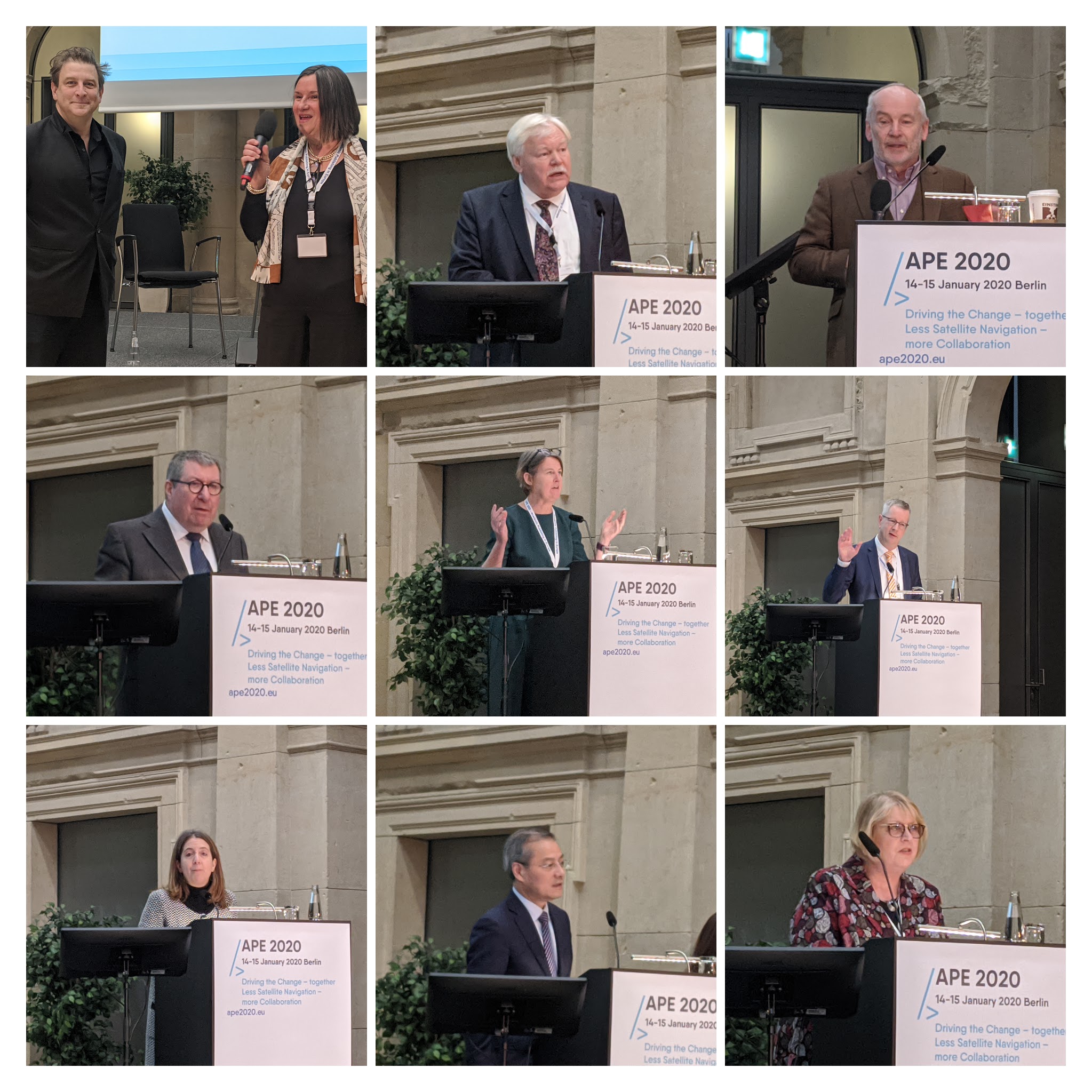Last week, I was fortunate to be able to attend the Academic Publishing in Europe conference. Conference director Arnoud de Kemp and his colleagues served up a very strong program.
I decided to attend the conference because I wanted to understand European scholarly communication policy issues more deeply. Being in Berlin, a crossroads city whose history overwhelmed me, it is clear to me that while so many strive to create a global system for science and scientific publishing, history is still alive and geopolitics still matters. In particular, while some talk about global science, China’s skyrocketing investment in its scientific sector is causing real anxiety for Europe.
Global Science
The conference opened with a brief welcome by Günter Ziegler, the president of the Freie Universität Berlin. In it, Ziegler derided the the Association of American Publishers’ December letter, which opposed the leaked Trump Administration plan to remove embargoes from the open access mandates on articles resulting from federally funded research.
He pointedly mocked the letter, and not only for what he saw as its retrograde stance impeding full and immediate open access. Perhaps even more so, Ziegler lambasted the letter for adopting some of the nationalist language designed to appeal to administration officials. He specifically ridiculed the letter’s invocation of “American publishers” and “American science,” which he asserted to be inseparable from global scholarly publishing and global science.
Global science is a beautiful vision, informed by the ideals of scholarly communication many of us would wish to see. But, it became clear as the day proceeded how far Ziegler’s utopian claims were from being universally accepted in Europe.
European Publishing
By contrast, speakers involved in European policy and purchasing leadership for scholarly communication took a much less globalist perspective. There are at least three overlapping actors promoting open access in Europe — the European Union, Coalition S, and Projekt DEAL — and we heard something from each of them during the course of the conference. I am going to dwell on each of them, because although all aim to speed along the transition to open access, and each is working on a solution set that seems to make good sense for many in Europe, there are important differences between them, both in their objectives and their tactics.
The EU
Jean-Claude Burgelman, the EU open access envoy, gave a terrifically clear talk that helped me understand why many in Europe are so focused on open access. He took a triumphalist approach to begin, saying that while most publishers once resisted open access in opposition to his calls, now it is inevitable, specifically playing up how far Europe now is ahead of the rest of the world in its adoption of open access and open data models, both through public initiatives and commercial businesses. Speaking for the EU as an organization, he is not concerned at all about the amount of resources devoted to publishing, since it is a tiny fraction of research and education budgets. No — Burgelman’s biggest fear is that Europe will fail to seize the momentum it has developed in open science and as a result fall behind in the sciences overall, as Europe has done in other innovation sectors.
Specifically to science, Burgelman fears “Europe’s main Coll/petitors waking up (China, US).” In the context of this competition, he fears that Europe is at grave risk of falling behind. And it makes sense that he would fear this, since Europe, according to a recent Elsevier report [PDF], has already fallen into third place in R&D intensity, which is probably a leading indicator, and China is on the way to catching up to the EU on research impact as well.
Illustrating what appeared to be an EU anxiety, Burgelman invoked the sad collapses of both Minitel and Nokia, where nationally championed innovators were once dominant but soon collapsed against the greater agility of largely US enterprises and ecosystems. Taking a lesson from these cases, Burgelman assesses that the biggest risk facing European science and scientific publishing is “the H syndrome — hesitation.”
Looking ahead, Burgelman sees a transformation to data science as the new methodology that will take over essentially all fields of inquiry. As a result, he sees open science (including open access) not only as good in itself but as a vital enabler of a data science strategy. In this way, for Burgelman, open science is a key component of the strategy for enabling Europe to continue to lead in the sciences over time.
There is great merit to the argument that data science methods will continue their exponential growth in impact across the sciences, and well beyond. But is open science the most effective strategy for taking the lead in this new field? That may be a strong hypothesis, but it feels to me at least well short of an absolute certainty. And then Burgelman concluded, not (as an American might) that competition among European innovators should be unleashed, but rather that a “pan European effort” is needed.
To view European science as at least somewhat in competition with China and the US calls directly into question the idea that there is a single global scientific panacea. But if Burgelman has diagnosed the problem, it is less clear he has a realistic solution.
Plan S
Marc Schlitz, the president of Science Europe, then spoke on behalf of Plan S and Coalition S. Schlitz put on a brave face for Plan S, but there is little progress to report in funder participation — including, notably, the absence of the German national funding agency — leaving it still anchored almost exclusively in Europe. In the meantime, the Coalition has moved away from any immediate plans to cap APCs, suggesting that it is moving towards efforts to compromise with publishers.
The mood of many attendees seemed to be that Plan S has plateaued. Of course, with deadlines still ahead, anything can happen. Will the Coalition have enough weight to sway publishers? Will publishers set up some kind of parallel — i.e., separate — system for Plan S researchers? Or will the Coalition end up backing down further from its original radicalism?
Plan S also received some discussion when a report about cost transparency among publishers was formally released at APE by Alicia Wise of Information Power. While Coalition members are investing substantially to ensure that cost transparency is achieved (calling it, strangely, price transparency), it was notable that no audits are planned of the reported costs but rather Yelp-style online reviews of publishers will be the monitoring mechanism. The Coalition now plans to move into a piloting mode with a select group of publishers.
Projekt DEAL and Transformative Agreements
Regardless of what Plan S may yield, transformative agreements, which bundle subscriptions with open access publishing services, clearly continue to gather momentum. And while DEAL has received a great deal of attention, it is of course just one national microcosm of the array of transformative agreements being struck at a national level across many European countries.
The impact of transformative agreements is clear. Dagmar Laging showed a map of 11 European countries with which Springer Nature has reached transformative agreements. She also reported that these agreements have resulted in a significant rise in the share of publisher activity that falls under the gold open access model to at least to 70% and in one case to 90%.
The DEAL approach is not without its critics. In focusing on the three publishers to which its members devote the great majority of their spend, DEAL is piloting models that work for the major incumbents rather than their startup competition. And, it is clear that there is an enormous amount of administrative machinery necessary to implement these transformative agreements. But, in a small piece of news made from the podium, DEAL’s head Horst Hippler reflected on Elsevier CEO Kumsal Bayazit’s conciliatory speech earlier that morning to say that perhaps it will be time to restart negotiations between DEAL and Elsevier.
As the EU and other major players in Europe pursue parallel efforts towards greater open access, at least some of them are pursuing what they see as geopolitical imperatives. With respect to scholarly publishing in Europe, Plan S has yielded both tremendous interest and anxiety, while the impact of transformative agreements have been comparatively underreported. Whether any model for open access transformation can gain such traction outside of Europe of course very much remains to be seen.
China’s Rise
The final piece in the puzzle is China. As noted above, there is European (and certainly American) anxiety about China’s rise. Up until now, China’s skyrocketing research sector has created a growth area for many Western scholarly publishers, both as a market for their publications and as a source of article growth. But the tone on China among Western publishers has shifted and is now more squarely about questions and risks rather than unbridled opportunity.
Lin Peng, from China Science Press, gave a “surprise” opening address, speaking in general terms about the rise of Chinese publishing. China Science would have been on the minds of many attendees anyway, since it recently purchased French scholarly publisher EDP. Lin was asked whether he expected to purchase any other European publishers, to which he warmly responded, “If you are willing to sell, and we can afford to pay, we are willing to have discussions.”
In another session, Eefke Smit and Ed Gerstner had a vigorous “wake-up” conversation that featured a good deal of discussion about China. They touched on whether China was truly prepared to embrace globally open science, with Gerstner noting that reuse of certain data (for example, cell lines) requires permission that is apparently not granted to foreigners. They also spoke extensively about research ethics, and how publishers can navigate submissions that may be compromised by elements of the Chinese techno-surveillance state.
Finally, Michael Mabe, the recently retired CEO of STM, gave a closing talk reflecting on the state of the sector and some predictions and recommendations for the future, with some special emphasis on China. One question is whether China will attempt to build an entirely separate scholarly publishing infrastructure — “Chinese Journals for Chinese Science” — and whether we will see the center of gravity of scholarly publishing shift from Amsterdam, London, and Oxford, to Beijing and Shanghai.
But, it is also possible that we could see two completely separate infrastructures emerge — with China split from the US and Europe.
Reflections
I have been reflecting more and more on China ever since hearing Ian Bremmer at the Silverchair meeting last fall predict that China and the US would take increasingly separate paths when it comes to data, advanced technology infrastructure, and artificial intelligence. I have wondered if the same geopolitical forces shaping this split will cause a rift in the scientific enterprise and with it scholarly publishing. Perhaps the question is really more a matter of whether we will see stronger global competition in science and along with it scientific publishing — or instead the hard split that seems to be emerging on other forms of data, advanced technology, and AI.
Understandably, Europe feels very protective of its scholarly publishing sector, which, especially when UK activity is considered, has been the global leader. And in light of Brexit, there are additional reasons not only for British but also European anxieties about what the future may bring this sector. But while the US may long have been fine to import scholarly publishing services from Europe, the growth in scientific research in other regions — especially but not exclusively China — suggests different futures ahead. There is every reason to believe that, even if science continues to globalize, a strong Chinese scholarly publishing sector will develop.
Of course, the underlying question is less about scientific publishing than it is about the scientific sectors. I was impressed by an assessment last week by the chair of the National Science Board’s policy committee on China’s growth in science: “The continued spread of science and engineering capacity across the globe is good for humanity: science is not a zero-sum game.” As long as the scientific systems remain open to one another, so that they can build on one another, competition itself is not a problem. Indeed, it has been a key ingredient in science as we know it.
But, as I reflected on this conference in Berlin, a city whose history has been filled with great culture, great tragedy, great science, and great evil, I caution against sunny optimism. Too many times and far too easily, geopolitical rivalry has slipped into cold wars and worse. While scientists, librarians, and publishers have a role to play in building bridges, we alone will not control these developments.
Discussion
3 Thoughts on "Global Science, China’s Rise, and European Anxiety"
I’m glad to see a recognition that geopolitical rivalry is not just an issue of ‘nationalism’, but also of ‘regionalism’. Throughout the Brexit debate, there have been commentators arguing very strongly that ‘nationalism’ is a terrible vice, and claiming that it is ameliorated by forming nations into a larger block like the EU, which is some how supposed to be impervious to ‘nationalistic’ vices. Yet many supporters of the EU also see it as a geopolitical unit that can counter the ‘nationalism’ of China, the USA and others.
People tell me, without irony, that ‘Chinese Science’ and ‘British science’ are absurd and meaningless ideas, creating false barriers stemming from terrible ‘nationalist’ inclinations, but that ‘EU science’ is a noble collaborative endeavor. This just seems like ‘nationalism’ on a greater scale.
https://twitter.com/MsPhelps/status/1217032709756932096
Thank you Mark. If the EU is a geopolitical unit — which certainly many of its advocates seem to believe — then it seems only natural that it find itself competing with other large geopolitical units, such as the US and China. In many ways, isn’t this simply a recognition of the scale needed for such competition?
It’s amazing to me how much of these matters seem to come down to what is apparently a somewhat nuanced difference between healthy competition and vices, rivalries, rifts, and splits.
Good points on China. I was there a few years ago and was overwhelmed by the equipment they have and number of hardworking young scientists and technicians. They buy not only car manufacturing companies and hotels but also European publishing houses!




